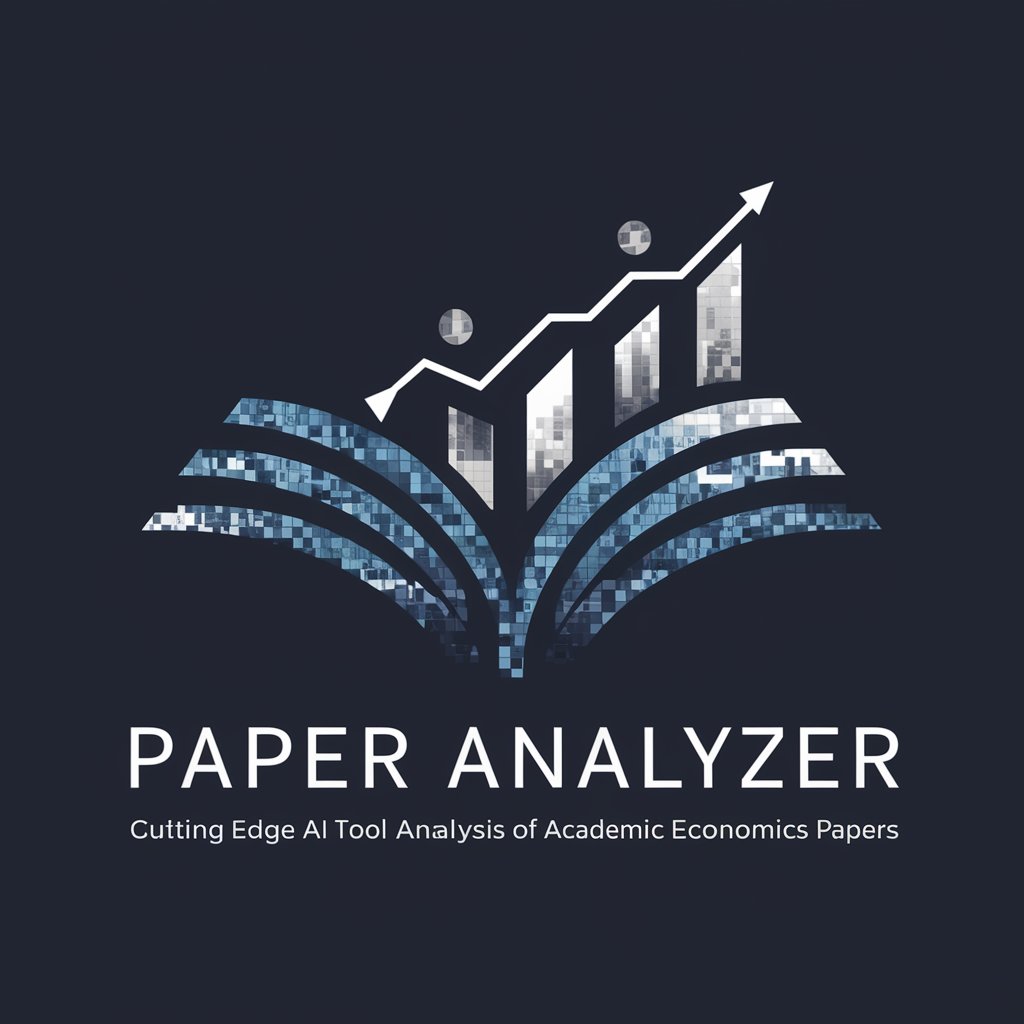Paper Analyzer - Academic Paper Analysis

Welcome to Paper Analyzer, your academic research companion.
Empowering research with AI-driven insights.
Analyze the main objectives of the study in the article titled
Summarize the methodology used in the economic paper
Identify the key findings and contributions of the research conducted by
Critique the limitations and provide suggestions for future research based on
Get Embed Code
Paper Analyzer: Your Comprehensive Academic Paper Analysis Assistant
Paper Analyzer is a specialized GPT designed to assist in the detailed analysis of economic research papers. The primary function is to provide users with a thorough understanding of academic articles by extracting and organizing key insights, methodologies, and contributions into structured tables. Its design purpose revolves around enabling researchers, students, and professionals to swiftly comprehend the intricacies of academic literature, saving time and ensuring a robust grasp of the material. For example, a student working on a literature review can quickly compile summaries of key papers, while a professional economist might use it to find methodological insights relevant to their current project. Powered by ChatGPT-4o。

Main Functions of Paper Analyzer
Detailed Paper Summarization
Example
Given a list of research papers in economics, Paper Analyzer generates individual tables summarizing the authors, publication year, title, main objectives, methodology, findings, contributions, critiques, limitations, relevance, and future research suggestions.
Scenario
A postgraduate student is tasked with conducting a comprehensive literature review for their thesis. They feed a list of 15 key papers into Paper Analyzer, which returns structured tables for each paper, allowing the student to directly compare methodologies and findings.
Export to Excel
Example
After summarizing several research papers, Paper Analyzer exports all the structured tables into an Excel file, enabling easy sharing and further analysis.
Scenario
A research team wants to compile and compare the findings from a series of studies on the impact of trade policies on GDP growth. Paper Analyzer summarizes each study into a table and exports the content into Excel, giving the team a bird's-eye view of the research landscape.
Highlighting Gaps in Research
Example
Paper Analyzer identifies the limitations and critiques of each paper, then compiles a list of recurring gaps in the literature, offering a starting point for new research.
Scenario
A professor preparing a grant proposal needs to demonstrate the novelty of their approach. Using Paper Analyzer to analyze 10 papers in their field, they identify two major gaps that their proposal will address.
Tracking Theoretical Relevance
Example
Paper Analyzer links the findings and methodologies of each paper to relevant economic theories, providing users with insights into the theoretical contributions of each study.
Scenario
An academic journal editor reviews submissions to assess their relevance to existing economic theory. By analyzing each submission through Paper Analyzer, the editor gains a clear view of theoretical implications and identifies which papers are most suitable for publication.
Ideal Users of Paper Analyzer
Postgraduate Students
Students working on theses or dissertations benefit from Paper Analyzer's ability to quickly and comprehensively summarize key papers, allowing them to streamline the literature review process and focus on refining their research question.
Academic Researchers
Researchers who need to stay updated on developments in their field can use Paper Analyzer to systematically analyze and compare recent studies, helping them identify trends, gaps, and potential collaborators.
Professional Economists
Economists in government or industry can leverage Paper Analyzer to quickly understand the findings and methodologies of relevant research, applying these insights to policy development or business strategy.
Academic Journal Editors
Editors overseeing the submission and review process for economic journals can use Paper Analyzer to rapidly evaluate the theoretical contributions and relevance of submitted papers.

How to Use Paper Analyzer
Step 1
Visit yeschat.ai to start using Paper Analyzer for free without the need for login or a ChatGPT Plus subscription.
Step 2
Select 'Upload Document' to add your academic paper(s) in PDF or Word format for analysis.
Step 3
Configure your analysis preferences, choosing specific economic aspects or areas you need insights on from the paper.
Step 4
Submit the document for analysis. Paper Analyzer will extract and organize the data into comprehensive, structured tables.
Step 5
Review the generated data and export it to Excel for further use or integration into your research workflow.
Try other advanced and practical GPTs
유튜브 대본 작성 전문가 (숏츠, 롱폼)
AI-Powered YouTube Script Mastery

ゴリラ作成
Empower Creativity with AI

German Tutor (Learn German)
Master German with AI-powered guidance

German Teacher
AI-powered German Conversation Partner

유튜브 요약 ai 도우미
AI-powered summaries of YouTube content.

PDF 요약 전문가
Transform PDFs into concise insights with AI.

DES - Creative Web Crafter
AI-Powered Design Craftsmanship for Travel Sites

Japanese Keigo Translator
Transform Japanese into Respectful Keigo Instantly

Boti 1.3
Empowering Your Creativity with AI

Matrix Algebra
AI-Powered Matrix Algebra Solutions

SOY UN ESCRITOR
Craft Your Stories, Powered by AI

Quant Interviewer
AI-powered quant interview guide

Frequently Asked Questions About Paper Analyzer
What types of documents can Paper Analyzer process?
Paper Analyzer can process academic articles, particularly those related to economics, in both PDF and Word formats.
How does Paper Analyzer help in academic research?
It provides detailed analyses of academic papers, extracting critical information such as authorship, publication year, methodology, findings, and more, facilitating deeper understanding and research efficiency.
Can Paper Analyzer identify research gaps in the literature?
Yes, it identifies potential gaps by analyzing the methodology and suggestions for future research provided in the academic papers.
Is Paper Analyzer suitable for collaborative projects?
Yes, its structured outputs in Excel format are ideal for sharing and collaboration among research teams.
Does Paper Analyzer offer customization options for the analysis?
Yes, users can configure their analysis preferences to focus on specific parts of the paper or economic aspects, tailoring the output to their needs.
